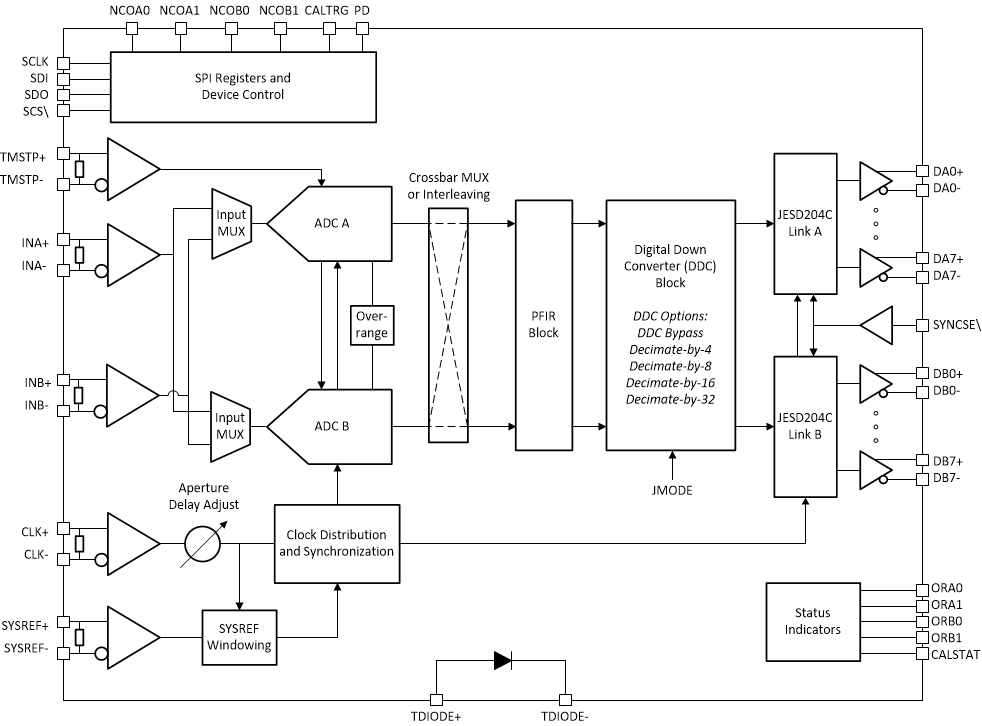ZHCSQC1D June 2022 – June 2024 ADC12DJ5200-EP
PRODUCTION DATA
- 1
- 1 特性
- 2 应用
- 3 说明
- 4 Pin Configuration and Functions
-
5 Specifications
- 5.1 Absolute Maximum Ratings
- 5.2 ESD Ratings
- 5.3 Recommended Operating Conditions
- 5.4 Thermal Information
- 5.5 Electrical Characteristics: DC Specifications
- 5.6 Electrical Characteristics: Power Consumption
- 5.7 Electrical Characteristics: AC Specifications (Dual-Channel Mode)
- 5.8 Electrical Characteristics: AC Specifications (Single-Channel Mode)
- 5.9 Timing Requirements
- 5.10 Switching Characteristics
- 5.11 Typical Characteristics
-
6 Detailed Description
- 6.1 Overview
- 6.2 Functional Block Diagram
- 6.3
Feature Description
- 6.3.1 Device Comparison
- 6.3.2 Analog Inputs
- 6.3.3 ADC Core
- 6.3.4 Temperature Monitoring Diode
- 6.3.5 Timestamp
- 6.3.6 Clocking
- 6.3.7 Programmable FIR Filter (PFIR)
- 6.3.8 Digital Down Converters (DDC)
- 6.3.9
JESD204C Interface
- 6.3.9.1 Transport Layer
- 6.3.9.2 Scrambler
- 6.3.9.3 Link Layer
- 6.3.9.4 8B/10B Link Layer
- 6.3.9.5
64B/66B Link Layer
- 6.3.9.5.1 64B/66B Encoding
- 6.3.9.5.2 Multiblocks, Extended Multiblocks and the Local Extended Multiblock Clock (LEMC)
- 6.3.9.5.3 Block, Multiblock and Extended Multiblock Alignment using Sync Header
- 6.3.9.5.4 Initial Lane Alignment
- 6.3.9.5.5 Block, Multiblock and Extended Multiblock Alignment Monitoring
- 6.3.9.6 Physical Layer
- 6.3.9.7 JESD204C Enable
- 6.3.9.8 Multi-Device Synchronization and Deterministic Latency
- 6.3.9.9 Operation in Subclass 0 Systems
- 6.3.10 Alarm Monitoring
- 6.4
Device Functional Modes
- 6.4.1 Dual-Channel Mode
- 6.4.2 Single-Channel Mode (DES Mode)
- 6.4.3 Dual-Input Single-Channel Mode (DUAL DES Mode)
- 6.4.4 JESD204C Modes
- 6.4.5 Power-Down Modes
- 6.4.6 Test Modes
- 6.4.7 Calibration Modes and Trimming
- 6.4.8 Offset Calibration
- 6.4.9 Trimming
- 6.5 Programming
- 6.6 SPI Register Map
- 7 Application Information Disclaimer
- 8 Device and Documentation Support
- 9 Revision History
- 10Mechanical, Packaging, and Orderable Information
3 说明
ADC12DJ5200-EP 器件是一款射频采样千兆采样模数转换器 (ADC),可对从直流到 10GHz 以上的输入频率进行直接采样。ADC12DJ5200-EP 可配置为双通道 5.2GSPS ADC 或单通道 10.4GSPS ADC。支持高达 10GHz 的可用输入频率范围,可对频率捷变系统的 L、S、C 和 X 频带进行直接射频采样。
ADC12DJ5200-EP 使用具有多达 16 个串行通道的高速 JESD204C 输出接口,支持高达 17.16Gbps 的线路速率。通过 JESD204C 子类 1 支持确定性延迟和多器件同步。JESD204C 接口可进行配置,对线路速率和通道数进行权衡。支持 8b/10b 和 64b/66b 数据编码方案。64b/66b 编码支持前向纠错 (FEC),可改进误码率。此接口向后兼容 JESD204B 接收器。
无噪声孔径延迟调节和 SYSREF 窗口等创新的同步特性可简化多通道应用的系统设计。提供可选的数字下变频器 (DDC),以便将数字信号频谱下变频到基带信号并降低接口速率。可编程 FIR 滤波器可实现片上均衡。
(1) 有关更多信息,请参阅节 10。
(2) 封装尺寸(长 × 宽)为标称值,并包括引脚(如适用)。
 ADC12DJ5200-EP 方框图
ADC12DJ5200-EP 方框图